Table of Contents
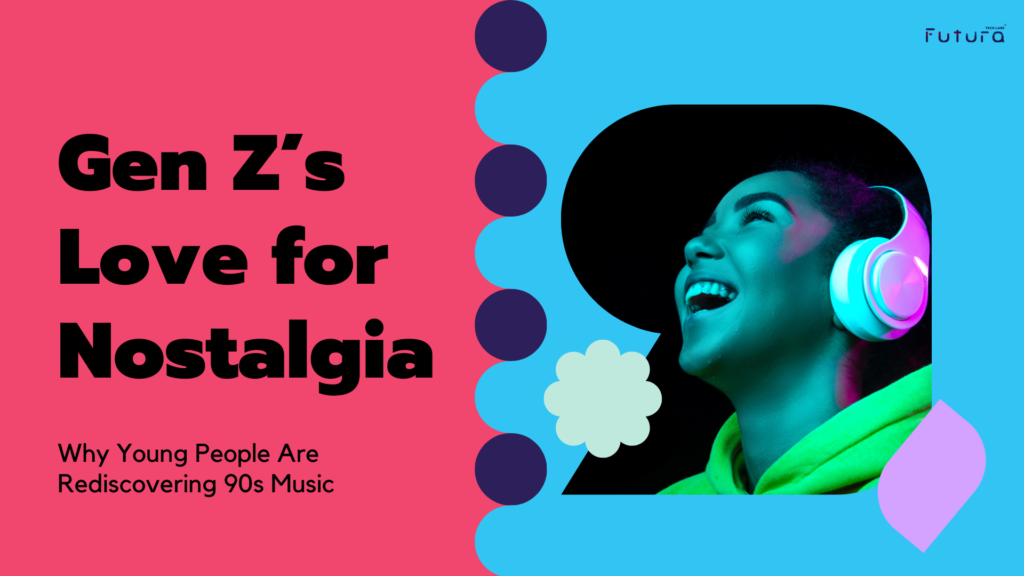
In a world inundated with the latest pop hits and audio streaming services, one might be surprised to find that Gen Z, the demographic cohort born between 1997 and 2012, has developed a deep affection for nostalgic music — specifically, the tunes from the ’90s and 2000s.
This cultural shift raises questions about the factors driving Gen Z’s love for past sounds and, interestingly, how this newfound appreciation is influencing their radio consumption.
Are we moving forward by revisiting the past? And is everything old and gold making a comeback?
One may believe that it’s solely the power of the oldies that’s pushing the younger generation to listen to music before their time, but it goes beyond the classics and more than you can imagine.
1. What’s Driving Nostalgia?
We all love a good trip down memory lane. Amazing smells, sweet sounds and memories of places and moments from our childhood give us a sense of comfort, security, and a reminder of simpler times.
But this phenomenon of embracing music from a decade they did not grow up in is somewhat unique to Gen Z.
If you grew up in the ’90s, you are most likely to be nostalgic about Backstreet Boys, Snoop Dogg, Nirvana or Mariah Carey. You’ve also lived through that decade through games, fashion, and music, therefore becoming a legit ‘90s OG.
But for Gen Z, even though they did not grow up in that era or truly experience it, listening to and loving the ’90s has got to do with their search for comfort, and escapism and for a time when life was less stressful and more carefree.
42% of Gen Z listen to music to escape from reality.
- GWI, Gen Z in 2023 Tweet
We can only blame the rounds of constant bad news, from the emergence of COVID-19, the rising cost of living, the war in Ukraine and Palestine and a new way of life for Gen Z as the first digital natives that know life with mobile phones, internet, and social media.
Sometimes it's better to live in the past than face today's problems.
2. The Music & Moods of Gen Z
While Millennials and Gen X listen predominantly to ’90s music, 29% of Gen Z prefer to listen to ’90s music over 23% to 2000s music.
This trend will continue in 2024 with businesses re-releasing iconic ’90s and 2000s toys and accessories, in hopes of appealing to the younger generation.
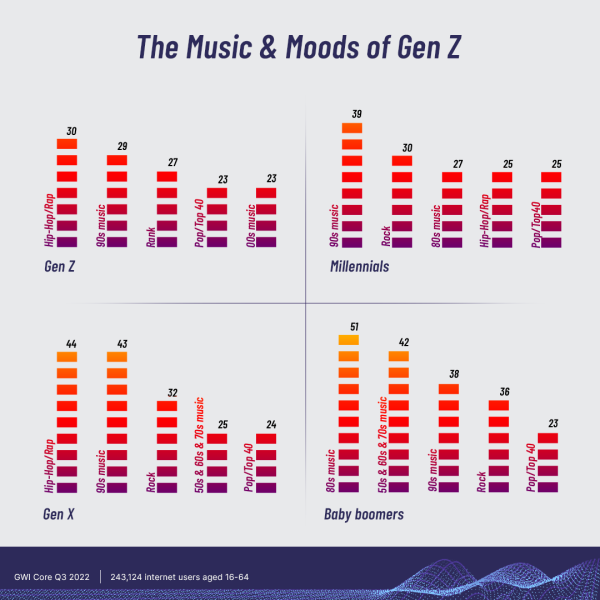
Gen Z also listens to more sad songs than any other generation. Spotify reported that the word ‘sad’ is the most searched term globally for Gen Z when it comes to looking for music. They prefer to look for songs that provide a nostalgic feeling and are more likely to embrace their emotions.
With Gen-Z, old is new and gold.
Platforms like TikTok also introduce younger audiences to songs from previous decades through viral challenges and trends.
Short video clips featuring classic hits turned into newer, edgier, faster versions encourage users to explore the full songs and delve deeper into the music from past eras.
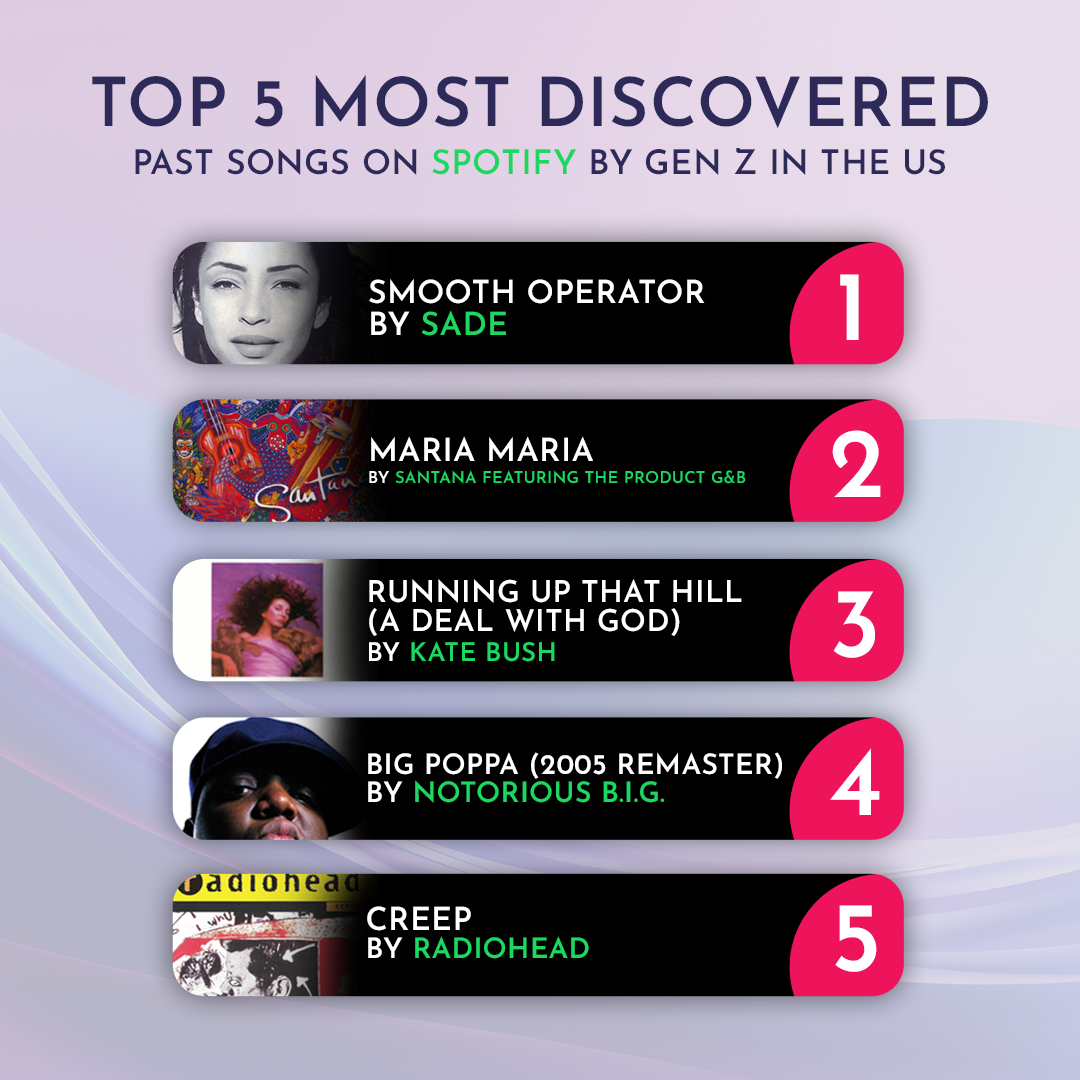
3. Does Radio Appeal to Gen Z?
There are 2 sides to this story: some will say that radio is not appealing to Gen Z and others may say it is.
The answer lies primarily in the number and secondarily, in the curated and communal nature of radio programming.
The medium that primarily gets Gen Z going is audio, and radio seems to be a big part of that experience.
One-third of this population stated that they started as radio listeners and then moved to streaming radio online.
A study done by Edison Research in 2022 revealed that radio is still going strong with the US Gen-Z population, landing itself in the top 3 with 15%, with YouTube taking the second spot with 24% and streaming audio at No.1 with 35%.
However, they listen to less radio and more audio sources than millennials (43%).
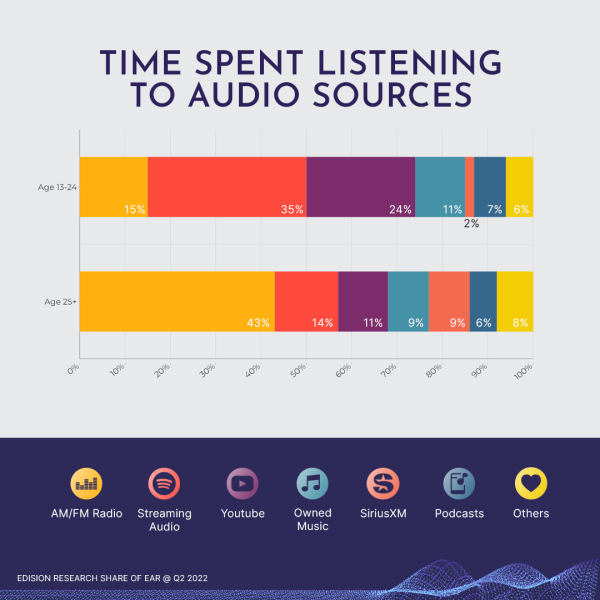
And yet, radio continues to make its mark as one of the only platforms to majorly drive advertisements: 85% of the 18-34 population prefers to listen to the radio than any other medium, even with advertisements.
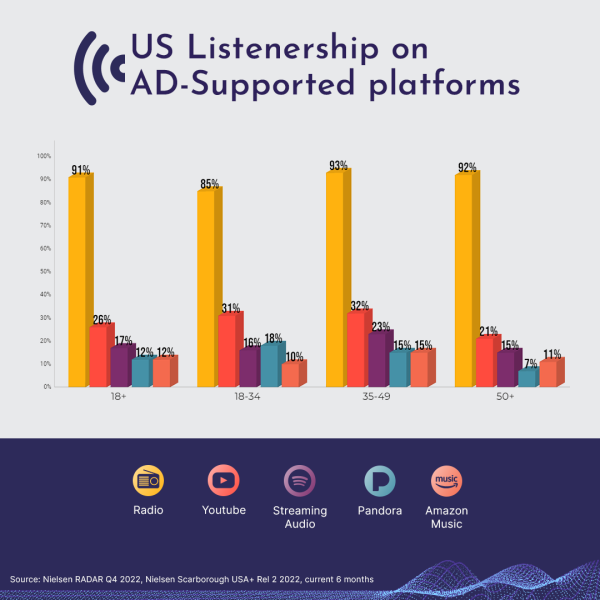
Edison Research’s ‘Share of Ear Q2 2023: How Americans Listen to Music’ also supported this claim stating that 69% of persons above 18 years of age spend more time and are open to listening to ad-supported radio.
In addition, radio is the leading ad-supported medium amongst 18-34. When it comes to in-car listening, 79% of 18-34 of the US population choose to listen to radio over 22% prefer using audio streaming services.
This could be attributed to the curated selection of songs, talk and news that help younger listeners get the best of both worlds: connecting with today’s world and yet living in a past time.
One research pointed out that young listeners feel radio helps them destress (72%) and provides them with better-curated content as opposed to audio streaming services (56%).
Other reasons include the element of surprise, the use of more human-driven playlists with hidden gems of songs and the real-time content and talk segments by radio DJs that add to the charm of radio listening. This is especially true for older music.
Music streaming services may not suggest some songs from the past as playlists are generated based on algorithms and not on true human understanding and experience.
This can limit ’90s songs like ‘Back In the Day’ by Ahmad, ‘Cha Cha Cha’ by Flipmode Squad and ‘Request Line’ by Zhane from appearing on streaming playlists.
Back in the Day by Ahmad (1994)
Cha Cha Cha by Flipmode Squad (1998)
Request Line by Zhane (1996)
But one can argue that with the birth of streaming services and on-demand music listening, radio will eventually lead to its death. There is conflicting evidence on this battle between radio and online streaming services.
However, research done in one of the most developed and highly economical countries has shown that radio is strong as ever and continues to be the dominant digital audio, even going as far as being 17 times bigger than streaming services in the US.
Harmonizing the Past & the Present
Gen Z’s love for oldies music, particularly from the 90s and 00s, reflects a desire for a connection to the past in a rapidly changing world.
Social media has played a pivotal role in introducing this generation to the timeless tunes of previous decades, fostering a cross-generational appreciation for music.
Surprisingly, as Gen Z dives into the sonic landscapes of the past, radio with its curated playlists and communal vibe, emerges as a significant player in their music consumption habits.
The interplay between nostalgia, social media, and radio demonstrates the complex yet harmonious relationship between the past and the present in shaping Gen Z’s musical preferences.
